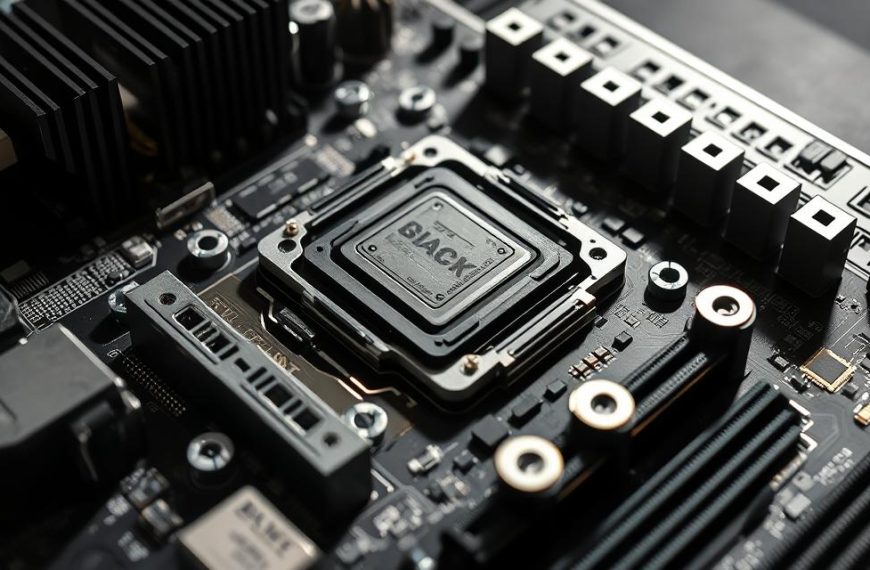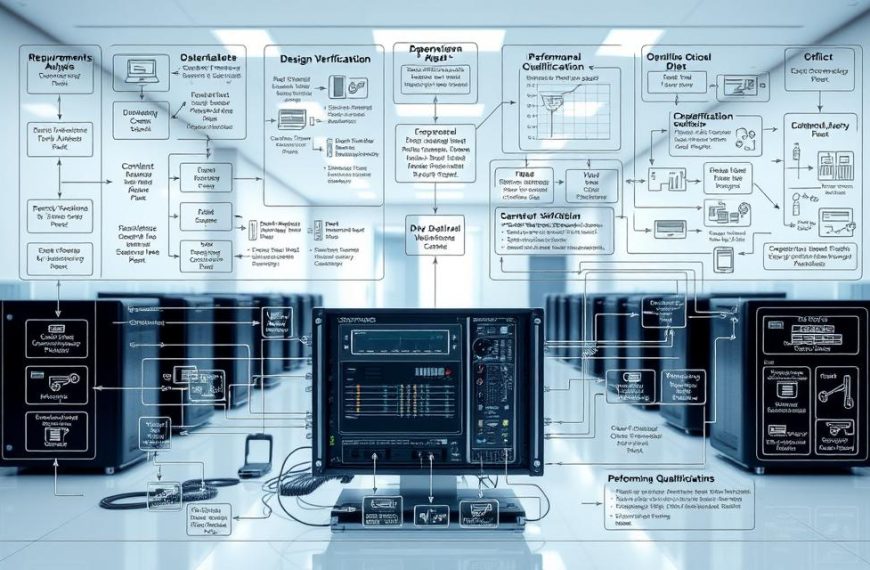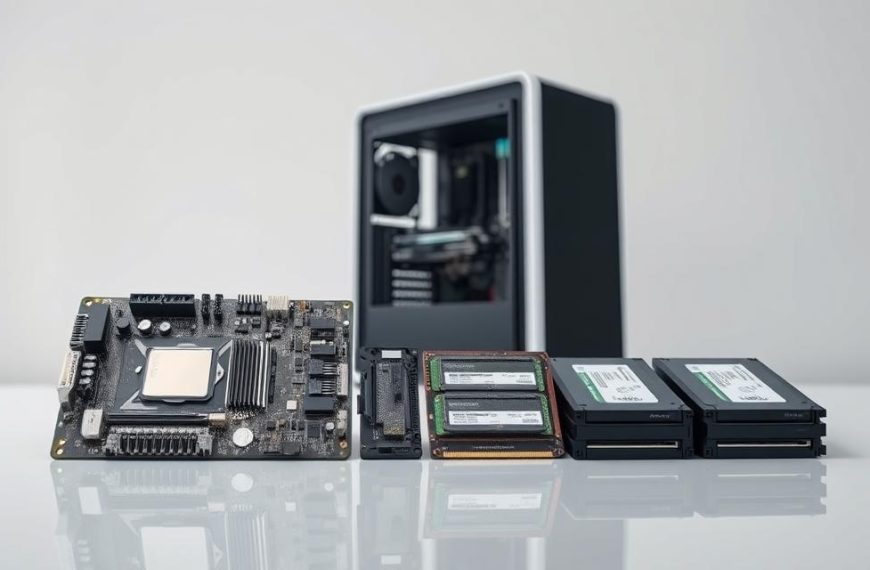Choosing between technology programmes is a big decision for students. It decides your whole career path. You have to pick between a computer science degree and a computer information systems degree.
These degrees lead to different tech career choices and skills. Knowing their differences is key to choosing the right path for you.
We’ll look at the programme structures, career paths, and what suits you best. We aim to guide you to the right choice for your career goals and interests.
Understanding Computer Science and Computer Information Systems Programmes
To choose between computer science and computer information systems, you need to know what they are. Both are in the tech field but teach and prepare you differently for work.
Defining Computer Science
Computer science is about studying how computers work and how to write algorithms. It looks at computing from a mathematical and theoretical view. It focuses on the basic ideas behind all digital tech.
Core focus and theoretical foundations
The study of computer science is all about thinking abstractly and designing algorithms. Students learn about maths like discrete maths, calculus, and logic. These basics help them create new tech solutions, not just use old ones.
Some main topics include:
- Algorithm design and analysis
- Data structures and computational theory
- Programming language development
- Software engineering principles
- Artificial intelligence foundations
Computer science started from maths and electrical engineering in the mid-20th century. People like Alan Turing and John von Neumann laid the groundwork. Today, it’s a mix of maths and practical tech, keeping its theoretical strength.
Defining Computer Information Systems
Computer information systems is about using tech in business. It combines tech skills with business knowledge. This makes experts who can turn business needs into tech solutions.
Business-technology integration emphasis
The CIS course focuses on business technology integration. Students learn to improve business processes with tech. This is different from computer science’s more theoretical approach.
Important areas include:
- Enterprise resource planning systems
- Database management for business intelligence
- Network infrastructure for organisational communication
- Cybersecurity measures for business protection
Practical applications in organisational contexts
CIS programs get you ready to work in business right away. It’s about using tech to solve real business problems, not creating new theories. This way, you can make businesses run better with the right tech.
Graduates are good at system analysis, project management, and making business processes better. They know how to use tech to help businesses stay ahead, making them very useful in any company.
Which is Better: Computer Science or Computer Information Systems?
Choosing between computer science and computer information systems depends on your career goals and learning style. Both paths lead to tech careers but from different angles.
Curriculum Comparison: Depth vs Breadth
Computer science and computer information systems have different teaching styles. Computer science focuses on deep technical skills. Computer information systems looks at how technology is used in business.
Computer Science: Algorithmic Depth and Mathematical Rigour
Computer science dives deep into maths and algorithms. Students learn about complex problems and how to solve them. The curriculum includes:
- Advanced calculus and discrete mathematics
- Algorithm design and analysis
- Computer architecture and operating systems
- Programming language theory
- Artificial intelligence and machine learning fundamentals
This approach builds strong analytical skills. Students learn to tackle complex problems with maths and algorithms.
Computer Information Systems: Business-Process Integration
Computer information systems combines tech and business. It teaches how to use technology in business settings. Key topics include:
- Database management systems
- Network administration and security
- Business process analysis
- Project management methodologies
- Enterprise systems integration
This approach prepares students to use technology to meet business goals. It focuses on applying existing tech, not creating new methods.
| Aspect | Computer Science | Computer Information Systems |
|---|---|---|
| Primary Focus | Theoretical foundations | Business applications |
| Mathematics Requirement | Advanced mathematics | Business mathematics |
| Programming Emphasis | Algorithm development | System implementation |
| Business Courses | Minimal to none | Significant component |
| Project Types | Technical prototypes | Business solutions |
Learning Outcomes and Skill Development
Computer science and computer information systems lead to different skills. Each program prepares students for different tech careers.
Abstract Problem-Solving vs Practical Implementation
Computer science graduates are great at solving complex problems. They learn to break down big issues into smaller parts. This makes them experts in software development and new tech.
Computer information systems graduates are good at using tech in business. They learn to manage tech projects and make sure systems work well. They’re skilled at finding the right tech for business needs.
Theoretical Knowledge vs Applied Solutions
Computer science focuses on understanding computing deeply. This lets graduates work with new tech and solve big problems.
Computer information systems teaches how to use tech in business. Graduates learn to pick and use tech that helps business run smoothly. They’re good at finding the right tech for business needs.
Both skills are important in tech. Whether you want to create new tech or use existing tech well depends on your choice.
Career Prospects and Employment Opportunities
Graduates in computer science and computer information systems have great job prospects today. Their career paths differ, showing the unique focus of each field.
Computer Science Career Pathways
Computer science graduates are known for their technical skills and problem-solving abilities. They create new solutions and explore new technologies.
Software development and engineering roles
Software developers and engineers make and fix applications and systems. They work in many places, from small startups to big tech companies.
Some common jobs are:
- Front-end developer
- Back-end engineer
- Full-stack developer
- Mobile application developer
Research and specialised technical positions
CS graduates do well in research jobs that need advanced technical skills. These jobs need strong analytical skills and creativity.
Some special roles are:
- Artificial intelligence engineer
- Machine learning specialist
- Data scientist
- Computer systems researcher
Computer Information Systems Career Pathways
Computer information systems professionals connect technology with business goals. They focus on using technology to help businesses work better.
IT management and business analysis
These jobs involve managing technology and making sure it meets business needs. They are key in linking tech teams with business leaders.
Some important jobs are:
- IT project manager
- Business systems analyst
- Technology consultant
- Information systems manager
Systems administration and network management
These roles deal with keeping technology systems running well. They make sure technology supports business operations.
Some common jobs are:
- Network administrator
- Systems analyst
- Database administrator
- Cloud solutions architect
Salary Comparisons and Market Demand
The US job market wants both CS and CIS experts, but pay varies. It depends on the job, experience, and area of expertise.
Current employment trends in the United States
Technology sectors are growing fast. Jobs like software developers have median salaries of about $145,080. This shows the need for technical skills.
CIS jobs also pay well:
- IT managers: $169,510 median salary
- Systems analysts: $95,360 median salary
These numbers show strong employment trends for tech jobs today.
Long-term career progression opportunities
Both fields offer great chances for growth. CS graduates can move up to senior or architecture roles. CIS graduates often become leaders or executives.
The salary comparison shows both fields offer good pay. Certain jobs pay more based on specialisation and experience.
Both CS careers and CIS careers are expected to grow. Technology keeps driving innovation in all industries.
Choosing the Right Programme for Your Goals
Choosing between computer science and computer information systems is a big decision. It affects your studies and future career. You need to think about your strengths, what you want to achieve, and what you prefer in your studies.
Personal Aptitude and Learning Style
Your natural talents and how you learn are key. Computer science is for those who love solving complex problems. Computer information systems is for those who enjoy applying technology in business.
Mathematical aptitude and abstract thinking
Computer science needs a good grasp of maths and abstract ideas. Students who enjoy solving puzzles and designing algorithms do well here.
This path is tough, with lots of calculus and discrete maths. But, if you love solving problems, you’ll find it rewarding.
Business acumen and practical orientation
Computer information systems focuses on using technology in business. Students who understand how tech helps businesses do well are best here.
This field is about solving real problems, not just theoretical ones. It’s for those who like making things work in the real world.
Professional Aspirations and Industry Requirements
What you want to do in the future affects your choice. Different jobs need different skills and education.
Tech industry vs corporate environment preferences
Computer science graduates often work in tech companies or research. They need to be good at solving technical problems.
Computer information systems graduates work in business or government. They focus on using tech to improve processes.
Entrepreneurial ambitions vs specialised technical roles
Those who want to start their own business might prefer computer information systems. It teaches you about business and technology.
For very technical jobs, computer science is better. It prepares you for careers in AI, cybersecurity, or systems architecture.
Programme Selection Considerations
Choosing a programme needs careful thought. Not all programmes are the same, even if they’re in the same field.
University offerings and accreditation
Look for programmes that are accredited by bodies like ABET. This means they meet high standards and are relevant to the industry.
Check the courses to make sure they match your career goals. Some programmes offer special areas of study that fit certain jobs.
Industry connections and practical experience opportunities
Programmes with strong connections to industry offer great networking and job chances. Look for ones with advisory boards and internships.
Programmes with lots of practical experience are more valuable. They help you apply what you learn in real situations, making you more employable.
Consider programmes that offer industry certifications. These can make you more attractive to employers.
Conclusion
Computer Science and Computer Information Systems are two different paths in education. Computer Science deals with the theory, algorithms, and design of systems. On the other hand, Computer Information Systems focuses on using technology in business.
Choosing between these degrees depends on your strengths and career goals. Think about whether you’re better at solving abstract problems or managing technology in business. Both paths lead to fulfilling careers in technology.
The difference between these fields is clear. Computer Science is for those who love innovation and technical depth. Computer Information Systems is for those who want to connect technology with business.
When making your final choice, consider what you enjoy learning and what you want to achieve in your career. Both degrees have great opportunities in the changing world of technology. Your decision should match your interests and career goals in the US market.













